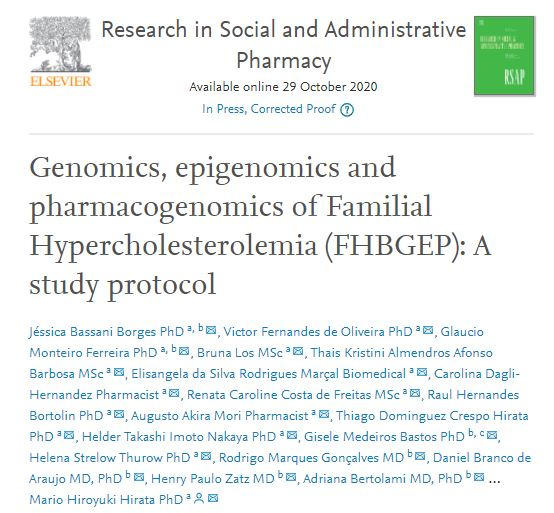Genomics, epigenomics and pharmacogenomics of Familial Hypercholesterolemia (FHBGEP): A study protocol.
Familial hypercholesterolemia (FH) is a genetic disease that affects millions of people worldwide. The study protocol FHBGEP was design to investigate the main genomic, epigenomic, and pharmacogenomic factors associated with FH and polygenic hypercholesterolemia (PH). FH patients will be enrolled at six research centers in Brazil. An exon-targeted gene strategy will be used to sequence a panel of 84 genes related to FH, PH, pharmacogenomics and coronary artery disease. Variants in coding and regulatory regions will be identified using a proposed variant discovery pipeline and classified according to the American College Medical Genetics guidelines. Functional effects of variants in FH-related genes will be investigated by in vitro studies using lymphocytes and cell lines (HepG2, HUVEC and HEK293FT), CRISPR/Cas9 mutagenesis, luciferase reporter assay and other technologies. Functional studies in silico, such as molecular docking, molecular dynamics, and conformational analysis, will be used to explore the impact of novel variants on protein structure and function. DNA methylation profile and differential expression of circulating non-coding RNAs (miRNAs and lncRNAs) will be analyzed in FH patients and normolipidemic subjects (control group). The influence of genomic and epigenomic factors on metabolic and inflammatory status will be analyzed in FH patients. Pharmacogenomic studies will be conducted to investigate the influence of genomic and epigenomic factors on response to statins in FH patients. The FHBGEP protocol has the potential to elucidate the genetic basis and molecular mechanisms involved in the pathophysiology of FH and PH, particularly in the Brazilian population. This pioneering approach includes genomic, epigenomic and functional studies, which results will contribute to the improvement of the diagnosis, prognosis and personalized therapy of FH patients.
Authors
Jéssica Bassani Borges; Victor Fernandes de Oliveira; Glaucio Monteiro Ferreira; Bruna Los; Thais Kristini Almendros Afonso Barbosa; Elisangela da Silva Rodrigues Marçal; Carolina Dagli-Hernandez; Renata Caroline Costa de Freitas; Raul Hernandes Bortolin; Augusto Akira Mori; Thiago Dominguez Crespo Hirata; Helder Takashi Imoto Nakaya; Gisele Medeiros Bastos; Helena Strelow Thurow; Rodrigo Marques Gonçalves; Daniel Branco de Araujo; Henry Paulo Zatz; Adriana Bertolami; André Arpad Faludi; Marcelo Chiara Bertolami; Amanda Guerra de Moraes Rego Sousa; João Ítalo Dias França; Cinthia Elim Jannes; Alexandre da Costa Pereira; Marcelo Arruda Nakazone; Dorotéia Rossi Silva Souza; Tayanne Silva Carmo; Marcelo Ferraz Sampaio; Renata Gorjão; Tania Cristina Pithon-Curi; Patricia Moriel; Vivian Nogueira Silbiger; André Ducati Luchessi; Jéssica Nayara Góes de Araújo; Michel Satya Naslavsky; Jaqueline Yu Ting Wang; Thales Kronenberger; Alvaro Cerda; Hui Tzu Lin-Wang; Adriana Regina Garofalo; Cristina Moreno Fajardo; Rosario Dominguez Crespo Hirata; Mario Hiroyuki Hirata
External link
Publication Year
Publication Journal
Associeted Project
Integrative Biology
Lista de serviços
-
Genomic analyses reveal broad impact of miR-137 on genes associated with malignant transformation and neuronal differentiation in glioblastoma cells.Genomic analyses reveal broad impact of miR-137 on genes associated with malignant transformation and neuronal differentiation in glioblastoma cells.
-
RNA-Binding Protein Musashi1 Is a Central Regulator of Adhesion Pathways in Glioblastoma.RNA-Binding Protein Musashi1 Is a Central Regulator of Adhesion Pathways in Glioblastoma.
-
MicroRNA Transcriptome Profiling in Heart of Trypanosoma cruzi-Infected Mice: Parasitological and Cardiological Outcomes.MicroRNA Transcriptome Profiling in Heart of Trypanosoma cruzi-Infected Mice: Parasitological and Cardiological Outcomes.
-
Genome mapping and expression analyses of human intronic noncoding RNAs reveal tissue-specific patterns and enrichment in genes related to regulation of transcription.Genome mapping and expression analyses of human intronic noncoding RNAs reveal tissue-specific patterns and enrichment in genes related to regulation of transcription.
-
Antimicrobial peptide LL-37 participates in the transcriptional regulation of melanoma cells.Antimicrobial peptide LL-37 participates in the transcriptional regulation of melanoma cells.
-
Down-regulation of 14q32-encoded miRNAs and tumor suppressor role for miR-654-3p in papillary thyroid cancer.Down-regulation of 14q32-encoded miRNAs and tumor suppressor role for miR-654-3p in papillary thyroid cancer.
-
Integration of miRNA and gene expression profiles suggest a role for miRNAs in the pathobiological processes of acute Trypanosoma cruzi infection.Integration of miRNA and gene expression profiles suggest a role for miRNAs in the pathobiological processes of acute Trypanosoma cruzi infection.
-
Integrative Biology Approaches Applied to Human DiseasesIntegrative Biology Approaches Applied to Human Diseases
-
Proteomics reveals disturbances in the immune response and energy metabolism of monocytes from patients with septic shock.Proteomics reveals disturbances in the immune response and energy metabolism of monocytes from patients with septic shock.
-
Genomics, epigenomics and pharmacogenomics of Familial Hypercholesterolemia (FHBGEP): A study protocol.Genomics, epigenomics and pharmacogenomics of Familial Hypercholesterolemia (FHBGEP): A study protocol.
-
Melatonin-Index as a biomarker for predicting the distribution of presymptomatic and asymptomatic SARS-CoV-2 carriersMelatonin-Index as a biomarker for predicting the distribution of presymptomatic and asymptomatic SARS-CoV-2 carriers
-
Profiling plasma-extracellular vesicle proteins and microRNAs in diabetes onset in middle-aged male participants in the ELSA-Brasil study.Profiling plasma-extracellular vesicle proteins and microRNAs in diabetes onset in middle-aged male participants in the ELSA-Brasil study.
-
Big Data and machine learning in cancer theranosticsBig Data and machine learning in cancer theranostics
-
Genomic positional conservation identifies topological anchor point RNAs linked to developmental loci.Genomic positional conservation identifies topological anchor point RNAs linked to developmental loci.
-
Integrative systems immunology uncovers molecular networks of the cell cycle that stratify COVID-19 severityIntegrative systems immunology uncovers molecular networks of the cell cycle that stratify COVID-19 severity

